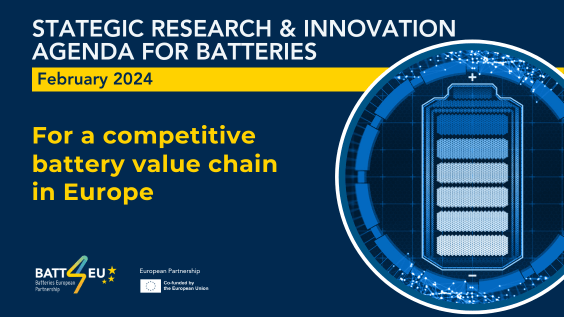
26 Apr Europe’s strategy on battery innovation is more relevant than ever
BATT4EU has published a new Strategic Research and Innovation Agenda recommending the battery research and innovation priorities for which public funding should be allocated effectively and efficiently.
The global demand for batteries has increased significantly in recent years, due to the rapid adoption of electric vehicles, renewable energy storage systems, and portable electronics. Given the expected growth in demand and the associated business opportunities, competition in the battery space is surging worldwide with China dominating. When it comes to battery manufacturing, China holds close to 70% of the current and forecast battery cell production capacity, with 101 battery plants planned till 2029. In the meantime, in Europe, the construction of 30 gigafactories has been planned to exceed 1 Terawatt-Hour capacity by 2030.
To reduce reliance on China for the EV transition, ensure open strategic autonomy and get close to climate neutrality, significant initiatives are now being developed in Europe and North America. Europe wants to compete with current manufacturing bases and increase its share of production to 25% within this decade.
Taking on the challenge of becoming a global leader in sustainable batteries will require constant and ambitious innovation efforts all along the battery value chain, from raw materials, to advanced materials, to battery manufacturing, application development and of course battery recycling.
INNOVATION IS HOWEVER COSTLY
Estimates by the European Battery Alliance suggest that the European battery market could be worth €250 billion a year as of 2025. To ensure that Europe develops fast and well its own competitive battery value chain able to meet the growing demand for more sustainable batteries, funding of innovation efforts by public authorities is of vital importance for the sector to reduce technology risks. Between 2014 and 2020, the battery industry received at least €1.7 billion in EU grants and loan guarantees, on top of state aid of up to €6 billion authorised between 2019 and 2021. With BATT4EU, the batteries European partnership, the current EU funding for battery research and innovation planned until 2027 should reach up to €925 million under Horizon Europe Programme. Innovation is however costly and despite the generous funding made available to Europe’s industry and research organizations, it is essential that limited available financial resources are allocated in the best way to maximise the impact of research and innovation efforts.
RESEARCH AND INNOVATION PRIORITIES ARE ALIGNED THROUGH A EUROPEAN STRATEGIC RESEARCH AND INNOVATION AGENDA
To avoid gaps in funding and duplication of research and innovation efforts, the BATT4EU Partnership has developed a new Strategic Research and Innovation Agenda (SRIA). The document represents the culmination of extensive consultations with over 200 members of the Batteries European Partnership Association (BEPA). In addition, it incorporates collaborative inputs from other significant European battery initiatives, including Batteries Europe and Battery 2030+, ensuring a comprehensive and unified approach to advancing battery technology across Europe.
The new SRIA outlines time-based research and innovation priorities for every part of the battery value chain and points to 6 imperatives that need tackling in order to increase the competitiveness of the European battery value chain.
The 6 imperatives of the SRIA are:
- Ensure research and innovation match industry needs to translate into gigafactories and markets
- Increase the strategic autonomy of Europe by reducing the reliance on imported critical raw materials
- Improve battery affordability to accelerate the green transition and keep the European industry competitive
- Improve the flexibility of battery manufacturing and recycling systems
- Implement a safe and sustainable by design framework for batteries
- Support the continuity of excellent European battery research and academic-industrial
THE SRIA AIMS TO GUIDE FUNDING IN EUROPE AND MAXIMIZE IMPACT
In conclusion, as Europe aims to establish itself as a global leader in battery research and innovation, the SRIA will serve as a reference to highlight key technological challenges, promote research and innovation, and guide funding priorities across Europe (at European level in Horizon Europe, at the level of Member States and Regions). This should maximize impact to help put Europe at the forefront of research and innovation, for the benefit of competitiveness across the European battery value chain.




